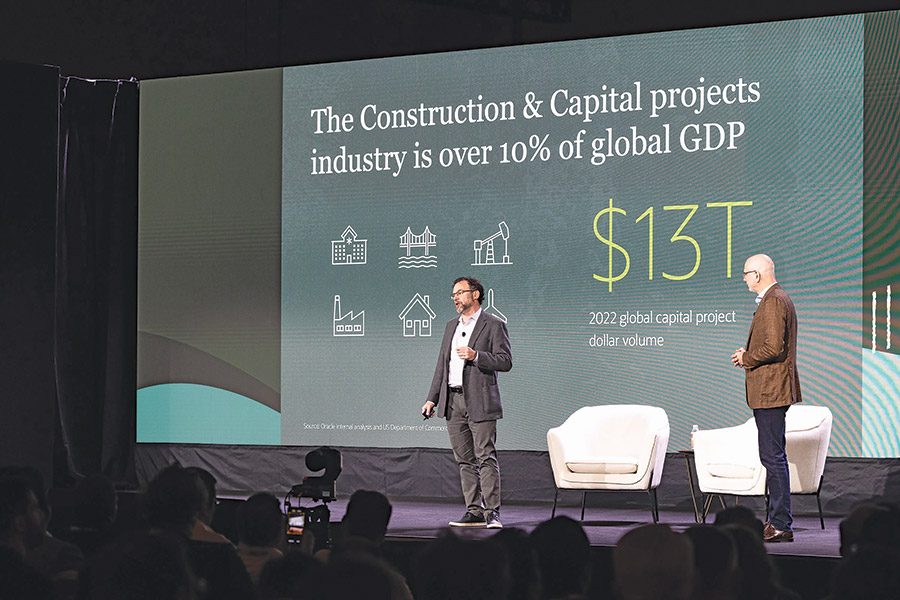
Josh kids
The construction industry is booming and will grow by $4.2 trillion worldwide over the next 15 years, according to Global Construction Futures. But that growth faces a challenge: a widening skills gap, a 41% increase in job openings compared to last year and a looming wave of retirements. Artificial intelligence offers a powerful solution that will significantly improve the way projects are designed, built and managed.
Unlock data interoperability
Data silos are currently making it difficult to set up. A 2024 study found that workers spend 18% of their time searching for information and 43% believe better data access would improve decision making. AI can help bridge this gap by turning raw data into actionable insights. By analyzing schedules, predicting risks and optimizing resources, AI enables a more efficient and attractive work environment.
The influence of AI is increasing across the entire construction lifecycle. During construction preparation, it has already proven to be invaluable for feasibility studies, material optimization and precise cost estimates. As construction progresses, AI can enable real-time progress tracking, predictive analytics to proactively avoid problems, and insightful Building Information Modeling (BIM) analysis. Even after the project is complete, advanced features such as predictive maintenance schedules and energy monitoring systems can continue to add value by optimizing operational efficiency, reducing costs and improving sustainability.
Accelerating AI adoption in construction
Several key factors are driving the adoption of AI in construction. The construction industry has reached a turning point in its technological evolution, following a progression seen in other industries: from standalone point solutions to first-generation platforms to truly intelligent platforms that synchronize activities and empower teams with predictive capabilities.
This growth forecast reflects three fundamental changes in this area:
Cost pressures and labor shortages have made efficiency improvements crucial. Cost control remains a key motivator, as AI can detect potential cost overruns early and optimize resource allocation throughout the project lifecycle. For example, one study estimates that AI-powered predictive analytics can reduce project costs by up to 15%.
Companies are working to break down their data silos to improve collaboration across teams.
The democratization of AI tools has made implementation more accessible.
How AI is changing the construction industry
Unlike manufacturing with its controlled environments, construction projects are complex ecosystems with countless variables – from weather conditions to regulatory requirements to multiple stakeholders with competing priorities.
Safety, always a top priority in construction, can be significantly improved through AI's ability to predict potential risks, monitor equipment performance for early signs of failure, and proactively identify hazards on the jobsite. This can lead to fewer accidents and a safer work environment for everyone involved.
AI can also increase the efficiency of planning and design processes. By enabling efficient schedule evaluations, streamlining design iterations, and providing comprehensive 3D model analysis, AI helps project teams optimize designs and identify potential problems before they become costly problems.
Productivity can also be significantly increased through AI integration. Optimized material procurement, optimized resource allocation and predictive maintenance plans help minimize downtime and enable smooth project progress. Additionally, quality control is improving through careful design analysis, increasing use of robotic precision in construction tasks, and AI-powered inspections, resulting in higher quality end products.
AI can promote more sustainable building practices by optimizing energy consumption and enabling comprehensive energy audits. This is particularly important considering that the construction industry is responsible for over 20% of global CO2 emissions. AI can also help contractors adopt more sustainable practices by minimizing waste, optimizing material usage, and promoting green construction methods.
Real-world applications of AI in construction
The transition from hypothetical possibilities to practical applications of AI in construction is already underway, and breakthrough projects are demonstrating its transformative potential. Practical examples show the noticeable effects of AI in construction. The Burj Khalifa, the world's tallest building, uses an AI-powered maintenance system to monitor its vast network of elevators, escalators and other essential machinery. This system can detect even the slightest signs of potential machine failure, enabling proactive maintenance and minimizing downtime.
The future of AI in construction is full of potential. As technology adoption continues to grow, the path from implementation to true transformation depends on three critical factors:
Connection: Break through data silos to create a unified view of projects and portfolios and connect teams through shared information
Intelligence: Leverage historical and real-time data to enable predictive analytics that identify potential risks before they occur and recommend optimal solutions
Orchestration: Synchronize activities across the construction ecosystem to ensure all parties can collaborate according to key project goals and see changes in real time
This growth is driven by the increasing integration of AI with BIM and robotics, creating a synergistic ecosystem of advanced technologies. Most importantly, the focus remains on expanding human expertise and providing construction professionals with powerful AI tools to improve their skills and drive innovation.
AI technology continues to evolve and will likely continue to have a major impact on how construction teams achieve their safety, efficiency and sustainability goals. To benefit from these advances, construction companies should invest in AI training for their workforce and test AI-powered solutions on key projects. The future of construction is intelligent, and those who rely on AI today are best prepared for success.
Josh Kanner, senior director of product and strategy at Oracle Construction and Engineering, was founder and CEO of Newmetrix before its acquisition by Oracle and also co-founder and CEO of Vela Systems before it was acquired by Autodesk.
